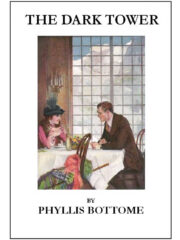She needn’t have been anything but young and gay and triumphant, but she never shirked anybody else’s pain. He had puzzled over her a good deal because, as far as he could see, she hadn’t the ordinary rules belonging to good people — about church, and not playing cards for money, and pulling people up. It wasn’t right and wrong she was thinking of most; it was other people’s feelings.
He tried not to love her like that, because it made it worse. It was like loving God and Peter; it mixed him all up.
He couldn’t see straight because everything he saw turned into love of her, and being with her seemed like being good; and it wasn’t, of course, if he concealed things.
The icy blue rink turned slowly into gold before he had quite made up his mind what to do. Making up his mind had a good deal to do with Lionel, so that he felt fairly safe about it. It was going to hurt horribly, but if it only hurt him, it couldn’t be said to matter. You couldn’t have a safe plan that didn’t hurt somebody, and as long as it didn’t hurt the person it was made for, it could be counted a success.
Davos began to descend upon the rink, first the best skaters — Swedes, Russians, and Germans — and then all the world. The speed-skaters stood about in heavy fur coats down to their feet.
Claire came down surrounded by admirers. Winn heard her laugh before he saw her, and after he had seen her he saw nothing else. She looked like one of the fir-trees when the sun had caught it; she seemed aflame with a quite peculiar radiance and joy. She flew toward Winn, imitating the speed-skaters with one long swift stride of her skates.
“Ah,” she cried, “isn’t it a jolly morning? Isn’t everything heavenly? Aren’t you glad you are alive?”
That was the kind of mood she was in. It was quite superfluous to ask if she was nervous. She was just about as nervous as the sun was when it ran over the mountains.
“There doesn’t seem to be much the matter with you this morning,” said Winn, eying her thoughtfully.
The rink cleared at eleven and the band began to play.
The judges sat in different quarters of the rink so as to get the best all-around impression of the skating. The audience, muffled up in furs, crowded half-way up the valley, as if it were a gigantic amphitheater.
A Polish girl, very tall and slender, with a long black pigtail, swung out upon the ice. She caught the music with a faultless steadiness and swing. Her eyes were fixed on the mountains; her flexible hips and waist swung her to and fro as easily as a winter bird hovers balanced on its steady pinions. Out of the crowd her partner, a huge black-bearded Russian, glided toward her, caught her by the waist, lifted her, and flung her from side to side in great swirls and resounding leaps. Her skirts flew about her, her pigtail swung round her in the air, her feet struck the ice firmly together like a pair of ringing castanets. The crowd shouted applause as he caught her by the wrists after a particularly dazzling plunge into the empty air, and brought her round to face them, her fixed eyes changed and shot with triumph. The dance was over.
Then a succession of men skaters came forward, whirling, twisting, capering with flying feet. Winn watched them with more astonishment than pleasure.
“Like a ring of beastly slippery microbes!” he remarked to Claire.
“Yes,” she said; “but wait.” Half a dozen men and women came running out on the rink; with lifted feet, hand in hand, they danced like flying sunbeams.
Then a German pair followed the Polish. Both were strong, first-rate skaters, but the man was rough and selfish; he pulled his girl about, was careless of her, and in the end let her down, and half the audience hissed.
Swedish, Norwegian, French pairs followed swiftly after. Then Claire rose with a quickening of her breath.
“Now,” she said, “you!” It was curious how seldom she said Major Staines.
Winn didn’t much care to do this kind of thing before foreigners. However, it was in a way rather jolly, especially when the music warmed one’s blood. He swept her out easily to the center of the ice. For a time he had only to watch her. He wondered what she looked like to all the black-headed dots sitting in the sun and gazing. In his heart there was nothing left to which he could compare her. She turned her head a little, curving and swooping toward him, and then sprang straight into the air. He had her fast for a moment; her hands were in his, her eyes laughed at his easy strength, and again she shot away from him. Now he had to follow her, in and out, to the sound of the music; at first he thought of the steps, but he soon stopped thinking. Something had happened which made it quite unnecessary to think.


"The Dark Tower" отзывы
Отзывы читателей о книге "The Dark Tower". Читайте комментарии и мнения людей о произведении.
Понравилась книга? Поделитесь впечатлениями - оставьте Ваш отзыв и расскажите о книге "The Dark Tower" друзьям в соцсетях.